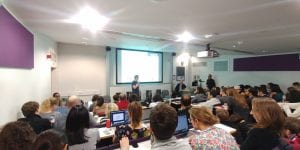 As part of the UCL Festival of Culture, Dr Gustav Milne – Honorary senior lecturer in the UCL Institute of Archaeology – gave a talk on Tuesday 24th May, entitled ‘Urban well-being: How to live paleolithically-correct lives in a 21st Century City’.
As part of the UCL Festival of Culture, Dr Gustav Milne – Honorary senior lecturer in the UCL Institute of Archaeology – gave a talk on Tuesday 24th May, entitled ‘Urban well-being: How to live paleolithically-correct lives in a 21st Century City’.
The idea that we as humans are not necessarily designed for the urban environments that many of us now dwell in is not necessarily a new one, but the extent to which this affects our health and life expectancy is more strikingly marked than might be expected.
Gustav began by outlining how our biology evolved thousands of years ago to support the hunter-gatherer lifestyle, and explained that while the environments we live in have changed, our basic physiology hasn’t. We were told that our biological legacy dates back 6 million years – our physiology and lung system have not really developed since then.
Gustav mentioned the Grand Challenges project that UCL Archaeology has partnered in with Transport for London and Arsenal football club, along with several other organisations, which examined the health profiles of different social groups and populations within Greater London.
The research carried out for this project discovered a noticeable difference in life-expectancy between residents in boroughs with large areas of green space, from those who live which are densely built-up and populated. Contrary to what we often hear, the figures obtained during this research indicate that it’s not about social class or income but where you live.
(more…)
Filed under Social & Historical Sciences
Tags: archaeology, cities, green space, health, health inequalities, healthy cities, town planning, UCL Festival of Culture, UCL Institute of Archaeology, urban planning, urbanisation
No Comments »
 Close
Close




 As part of the
As part of the 